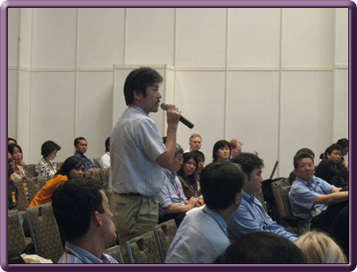The National Institute for Environmental Studies (NIES) and the Ministry of the Environment of Japan co-hosted a side event entitled: “Low-Carbon Asia: To be or not to be (How to Align Climate Change and Sustainable Development)” at the Thirteenth Conference of the Parties to the United Nations Framework Convention on Climate Change (UNFCCC) and the Third Meeting of the Parties to the Kyoto Protocol (COP13/CMP3) in Bali, Indonesia. The event included presentations by researchers from Asia (China, India, Indonesia, Japan, Nepal, and Thailand) and Great Britain and a panel discussion on feasible low carbon society measures that can be adopted by both developed and developing countries.
Even though the event was held on a Saturday afternoon, more than 100 people were in attendance. After an opening speech by Dr. Ryutaro Yatsu, Councillor in the Minister's Secretariat at the Ministry of the Environment, each of the scientists gave their presentations. Their speeches were followed by a question period which was led by Dr. Shuzo Nishioka, Adviser to NIES. Finally, Dr. Ryutaro Ohtsuka, President of NIES, gave his closing remarks. The following points were raised during the presentations and question period.
- It is important to have a clear vision of what a low carbon society entails.
- It is necessary to divide the work into what can be done by governments, what can be done by commercial enterprises, and what can be done by individual consumers and encourage each group in their efforts.
- Developing countries who are about to build up a massive infrastructure should make a clear plan for their development so that they do not end up with high carbon emitting urban areas like Los Angeles.
- Energy companies that do not make any changes to their operations will face reductions in their activities as the world heads towards low carbon alternatives; however, if these same companies turn into energy service companies that supply renewable energy, they are more likely to be accepted by society.
- Urgent actions are required
These points will be further discussed at the third Japan-UK Joint Workshop on Developing Visions for a Low Carbon Society which will be held from February 13 to 15, 2008 in Tokyo and the results of these discussions will be summarized in time for the G8 summit to be held in Japan in July 2008.


